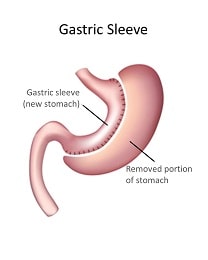Your Gastric Sleeve
for 3 800 € All Inclusive
Have you tried every diet and nothing works? You loose weight only to regain it after just a few weeks. For people who suffer from obesity and wish to permanently loose weight, sleeve gastrectomy (or gastroplasty) is the ideal solution.
What is gastric sleeve surgery?
Sleeve gastrectomy is a surgery, which consists of removing a large portion of the stomach. This will consequently diminish the patient’s appetite. Combined with a healthy diet and regular exercise, this surgery promises lasting and concrete results.
As a result of the surgery, the removed portion of the stomach will form a “tract”. The aim behind this process is to slow down food passage, which in turn will be evacuated in the small intestine.
Sleeve gastrectomy yields three key outcomes: Firstly, by reducing stomach size and volume, it enables patients to feel satiated with smaller food portions. Secondly, appetite is suppressed as the section of the stomach responsible for producing the hunger hormone Ghrelin is removed. Lastly, the surgery alters gut flora to shift patient preferences towards healthier food choices, such as vegetables, thereby reducing cravings for greasy or sugary foods.

What qualifies you for gastric sleeve surgery?
This operation is recommended for people suffering from obesity and having a BMI (body mass index) of over 40. People with comorbidities and having a BMI over 35 will also be considered for the surgery. Sleeve gastrectomy is particularly conceived for big eaters.
Before undergoing a sleeve gastrectomy, a patient must follow a series of preparatory steps. This includes attending one or two consultations with the surgeon to assess their overall health and ensure there are no contraindications for the surgery. Additionally, they must consult with a nutritionist to evaluate their dietary habits. A comprehensive medical check-up, including blood tests and abdominal imaging such as echography, tailored to the patient's specific needs, is also necessary prior to the procedure.
What happens before gastric sleeve surgery?
Before undergoing gastric sleeve surgery, several preparatory steps are typically involved to ensure the patient's safety and optimize the success of the procedure. Firstly, the patient will undergo a series of consultations with their healthcare team, including the surgeon and possibly a nutritionist. During these consultations, the patient's overall health will be assessed, and any potential contraindications to surgery will be evaluated. The surgeon will explain the procedure in detail, discussing the risks and benefits, as well as what to expect during the recovery period. Additionally, the patient may be required to undergo various preoperative tests, such as blood tests and imaging studies, to assess their overall health and ensure they are well-prepared for surgery. Depending on the patient's individual circumstances, they may also be advised to make lifestyle changes, such as adopting a healthier diet and increasing physical activity, in the weeks leading up to the surgery. Overall, thorough preparation before gastric sleeve surgery is crucial to ensuring a safe and successful outcome for the patient.
What does a gastric sleeve do?
A gastric sleeve, also known as sleeve gastrectomy, is a surgical procedure designed to assist individuals struggling with obesity in achieving significant weight loss and improving their overall health. This procedure involves the removal of a large portion of the stomach, leaving behind a smaller, sleeve-shaped stomach. But what does this transformation actually do for the body? Well, let's break it down. Firstly, by reducing the size of the stomach, the amount of food it can hold is significantly decreased. This means that patients feel full much quicker than before, helping them to consume fewer calories and lose weight more effectively. Secondly, the surgery alters the production of certain hormones, such as ghrelin, which is responsible for stimulating hunger. With less of this hormone being produced, patients often find that their appetite decreases, further aiding in weight loss efforts. Overall, a gastric sleeve can be a life-changing procedure for those struggling with obesity, providing them with the tools they need to embark on a journey towards improved health and well-being.
What happens during gastric sleeve surgery?
During a gastric sleeve surgery, also known as sleeve gastrectomy, several key steps are involved in reshaping the stomach to facilitate weight loss. The procedure begins with the patient being placed under anesthesia to ensure comfort and safety throughout the surgery. Then, the surgeon makes several small incisions in the abdomen, through which specialized surgical instruments are inserted. Using these instruments, the surgeon carefully removes a large portion of the stomach, leaving behind a narrow, sleeve-shaped tube. This reduction in stomach size restricts the amount of food it can hold, leading to feelings of fullness with smaller meals. Additionally, the surgery may alter the production of certain hormones that regulate hunger and metabolism, further aiding in weight loss. Once the sleeve is created, the incisions are closed, and the patient is monitored closely as they recover. Overall, gastric sleeve surgery is a transformative procedure that can help individuals struggling with obesity achieve significant weight loss and improve their overall health and well-being.
What does the follow-up process after undergoing a gastric sleeve procedure?
The day after surgery, it is possible for the patient to drink some water upon the surgeon’s consent. During the first month after surgery, the patient should eat slowly because the stomach is healing. The patient should also plan ahead 3 to 4 weeks of complete rest to quicken the recovery process.
The patient will be able to slowly get used to their new stomach during this period. He/she should be followed by a multidisciplinary team.
In general terms, vomiting and vitamin deficiency is rare during recovery.
The patient will feel pain during the first few days after the surgery. These pains will be alleviated thanks to antalgics prescribed by the surgeon. Vitamins and food supplements will also be prescribed.

What are the steps to follow after surgery?
These post-surgery steps are of paramount importance. The patient should follow them to the letter to ensure satisfactory results:
- The patient should consult a nutritionist at least once every 4 weeks in order to draw up a dietary program.
- The patient should consult the surgeon 3 months, 6 months and 12 months after the surgery.
- The patient should start practising a physical activity on a regular basis to maintain surgery results. Aside from walking, he/she will have the choice to practise swimming, dancing and several other activities. The choice will be based on the surgeon’s recommendations.
What are the results of sleeve gastrectomy?
The surgery promises impeccable results provided that the patient follows the advice of both their surgeon and nutritionist to the letter and exercises regularly (the patient can lose 40% to 60% of their weight)









